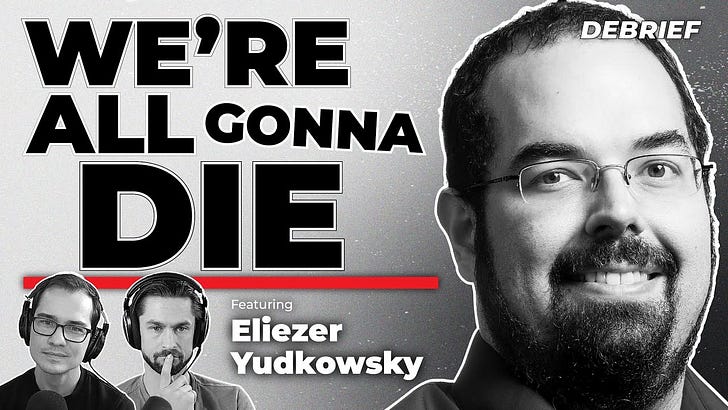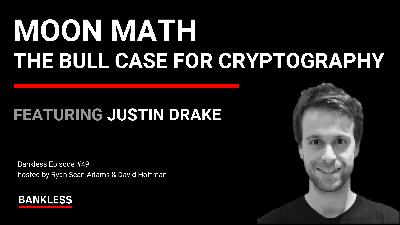🎙📺 Early Access: Death of Dollar Dominance | Lyn Alden
Description
Lyn Alden of Lyn Alden Investment Strategy comes to the Bankless to discuss the decaying position of the U.S. Dollar in the macro-environment, and gives us her predictive roadmap for the 2020 decade, as it relates to the Dollar, Bitcoin, and Ethereum.
You have early access to this episode and a copy of the transcript as a full Bankless Member.
Listen in Podcast App | iTunes | Spotify | YouTube | RSS Feed
Tools from our sponsors to go bankless:
⭐️ AAVE - BORROW OR LEND YOUR ASSETShttps://bankless.cc/aave
🚀 GEMINI - MOST TRUSTED EXCHANGE AND ONRAMPhttps://bankless.cc/go-gemini
💳 MONOLITH - GET THE HOLY GRAIL OF BANKLESS VISA CARDShttps://bankless.cc/monolith
📱 DHARMA | MOBILE ONRAMP DIRECTLY INTO DEFI https://bankless.cc/dharma
48 - Death of Dollar Dominance | Lyn Alden
Lyn Alden of Lyn Alden Investment Strategy has quickly risen to fame in the Bitcoin universe for her sharp analysis on long-term macro trends and brings plenty of data to back up her analysis.
She’s one of our favorite macro and economics minds. Global macro events have such a strong interplay with crypto. In order to understand crypto, we need to understand the big picture.
We ask Lyn about the changes forces around the US Dollar, as demand and supply of the Dollar is less understood and less stable than ever before.
We also ask Lyn about the relationship between the position of the U.S. Dollar as the world reserve currency, and the social unrest found inside the U.S. borders. It turns out, that the U.S. Dollar as the world reserve currency is not the best situation for those that reside inside the country!
We bring up Ray Dalio's Long Term Debt Cycles mental model, and ask Lyn to connect it to the Fourth Turning Theory, in an attempt to discover some of the hidden forces behind the social unrest found in America.
Fourth Turning Theory: https://en.wikipedia.org/wiki/Strauss%E2%80%93Howe_generational_theory
Highly recommended Lyn Alden piece on the Future of the Dollarhttps://www.lynalden.com/fraying-petrodollar-system/
Sign up for Lyn’s monthly macro newsletterhttps://www.lynalden.com/january-2021-newsletter/
Transcript
Ryan
Bankless Nation, I want to welcome Lyn Alden to the show of Lyn Alden Investment Strategies. She's quickly risen to fame in the Bitcoin universe for some sharp analysis on long term macro trends. And she's got a ton of data to back up her analysis, her blog is one of my favorite places to hang out to understand macro and economic trends. And because global macro events have such a strong interplay with crypto, we wanted to bring Lyn on to help us understand the big picture here. Lyn, welcome to Bankless. How are you doing today?
Lyn Alden
Hey I'm good. Thanks for having me.
David Hoffman
Well some people thought that our financial system sat atop a house of cards before COVID hit. So our first question to you is whether our global financial system is in a precarious position right now?
Lyn Alden
In a sense, I mean, it depends on what part you're looking at, I would say it was in a more precarious position right back before the great financial crisis. And that's where we saw a lot of the kind of the internal bailouts happening there. Because if you look at for example, how much bank reserves banks had relative to their liabilities, that's actually, you know, when they hit an all time low, since then they've been a lot higher. So it's kind of like the core banking systems have already been built out. But now we have more of a broad array of social issues, wealth, concentration, high debt levels, all sorts of things like that. And so in many ways, what happened, you know, about 12 years ago mirrored a lot what happened in the early 1930s, after the the famous 1929 crash. Whereas the kind of the environment we're going in now, it looks a lot more like the 1940s, hopefully, without the war that they had. But the basically in terms of a fiscal environment, like a massive kind of spending environment, and kind of a broader bailout of society. So that kind of one two punch of a private debt bubble and banking crisis, followed by like a public debt bubble, and you know, that tends to be more inflationary. But then aside from that, we also have, for example, the way the global monetary system is constructed, that's a whole 'nother beast entirely. And so, you know, if you go back before 1944, you had a variety of different gold standards. And then from 1944 to 1971, you had the Bretton Woods system that eventually broke down in the late 60s and kind of officially broke in 1971. And then since then, you've been on the petro dollar system. And science is starting to show that the petro dollar system starting to, you know, basically fall apart as well. And so that's somewhat different than the debt problem. But you know, it all kind of comes to a head probably here, you know, over the next 10 years, as we sort some of this out.
David Hoffman
So does that mean to say that you actually thought that the financial system was more precarious before the crisis reset ourselves to to some degree, and we're actually perhaps in a better place than we were pre 2008?
Lyn Alden
I think it depends on which part of the system you're looking at. And so for example, in terms of the way the global monetary system is constructed, the whole way that the international countries do trade with each other and what currency they use, that's in a worse state than it was 12 years ago. However, if you look at for example the domestic U.S. banking system it's more capitalized than it was back then. And it's because it basically imploded about 12 years ago. And due to those bailouts, it's at a much higher level of capitalization now and so by that particular metric it's far less fragile. And that's why for example in this crisis despite the fact that this was a much bigger economic impact, we haven't seen a lot of bank failures like we saw back then because that was specifically a banking failure. Whereas this is a broader solvency issue. So it really depends on what what aspect you're looking at
Ryan
This broader solvency issue that you're talking about, where we start to get into kind of like, what is money and reserve currency status? And that sort of thing? Is it a harder problem to solve, like, more difficult than what we faced in 2008?
Lyn Alden
Yeah, I think so. Because, you know, what we faced then, basically, there was a handful of actors that could be bailed out. And of course, there are all sorts of issues like what we saw with Occupy Wall Street and others sort of kind of push back against that, because, you know, you had people lose their homes and they didn't get bailed out, but then you had the banks that, they're the ones that often got bailed out. In terms of basically how they capitalized the system, that's an easier problem to fix. Whereas how to basically restructure society is a much harder problem. And if you go back in history, after you get the banking crisis that later part actually tends to be the hardest part. And so that's kind of where we are in the cycle. And it feels a lot different. So a lot of people you know, they fight the last battle, so that they always think that the next recession is going to end up being like the previous one before it. But it ends up basically imploding from another area. And so rather than having another banking crisis this time, we had, you know, a much different area that was impacted. It was the leverage and the bank system that was the issue. It was some of these other broader trends.
David Hoffman
So many people, and perhaps we could call them doomers, some people think that there was going to be some sort of event pre, again, pre COVID, that would destabilize the global financial system. And it doesn't matter what that event was. And it was going to create this financial crisis, no matter what the actual pre crisis was. And so now with COVID, we are seeing that there is a health crisis, yet the vaccine is starting to be rolled out, it kind of feels like we're maybe in the sixth or seventh inning of a health crisis. Yet some of these boomers might say that we are actually just in the beginning of a long term financial crisis. And maybe you don't feel so strongly about the crisis word, but I have read some of your writings, that you do believe that we are in a very transitional phase where we are going from one spot to the next. What are you seeing ahead of us that we are transitioning into? And what are the kind of macro forces behind that transition?
Lyn Alden
Yeah, so I think kind of the main crux of it is that in the 2020s, I expect a signifi





















